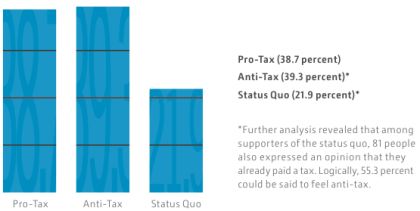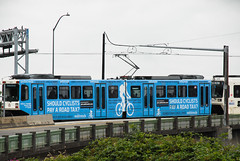Back in July a local web marketing company Webtrends wrapped a MAX train with the question, “Should cyclists pay a road tax?” I wasn’t too thrilled with it and made my concerns clear in an editorial about the campaign.
The campaign stirred quite a bit of debate and news coverage about the issue. Now Webtrends has released a follow-up report and analysis about their findings from the campaign. The company’s original plan was to create a follow-up MAX ad sharing the results of their findings (the ad in the photo above is still running).
However, according to report author and Webtrends’ Senior Manager for Social Media Marketing Justin Kistner, “The sides are too polarized and the topic is too complex for a Max ad to help advance the discussion or adequately educate people on both sides.”
Instead, Kistner has put together a six-page report on the campaign which they plan on posted to their website later today (download it here if you don’t want to wait).
Of the 946 comments tracked in the campaign (through blog comments, mentions on Twitter, etc…) more than half (55.3%) of the responses that actually answered the question were against the idea of having “cyclists” pay a road tax. Of the anti-tax respondents, the number one reason (67%) given was that people who ride bicycles already pay taxes that fund roads (those folks might want to check out the new jerseys at UK-based IPayRoadTax.com.)
Among the pro-tax respondents, the number one reason (44%) was along the lines of “The bike-only infrastructure only benefits people who cycle, so people who cycle should pay for it.”

Interestingly, more than half of the responses to the campaign did not event answer the “Should cyclists pay a road tax?” question. Of those “non-answer” respondents, 21% said the question was biased and 9% insulted Webtrends for asking it.
According to the report’s conclusion,
“The primary conflict among commenters came down to this: Does cycling infrastructure benefit only cyclists, or all road users? And thus, who should pay for it?”
Based on their analysis, Webtrends came up with three recommendations that “interested parties should address”:
- more education about how roads are funded is needed (“The amount of misinformation shared throughout this campaign was staggering”),
- more explanation of how bike infrastructure benefits all road users (“..it seems necessary to explain these shared benefits [less congestion, safer streets] to those who believe cyclists should pay for cycling-only infrastructure”),
- too many people riding bikes ride dangerously (“If these perceptions are deemed to have statistical merit, there may be a need to increase bike safety training within communities or schools”).
I stand by my criticisms of Webtrends’ approach to this entire campaign. However, despite those feelings, their analysis can be a useful tool for advocates and planners looking for guidance on this issue and it’s always interesting to hear what someone outside the bike bubble thinks about these hot-button issues.


